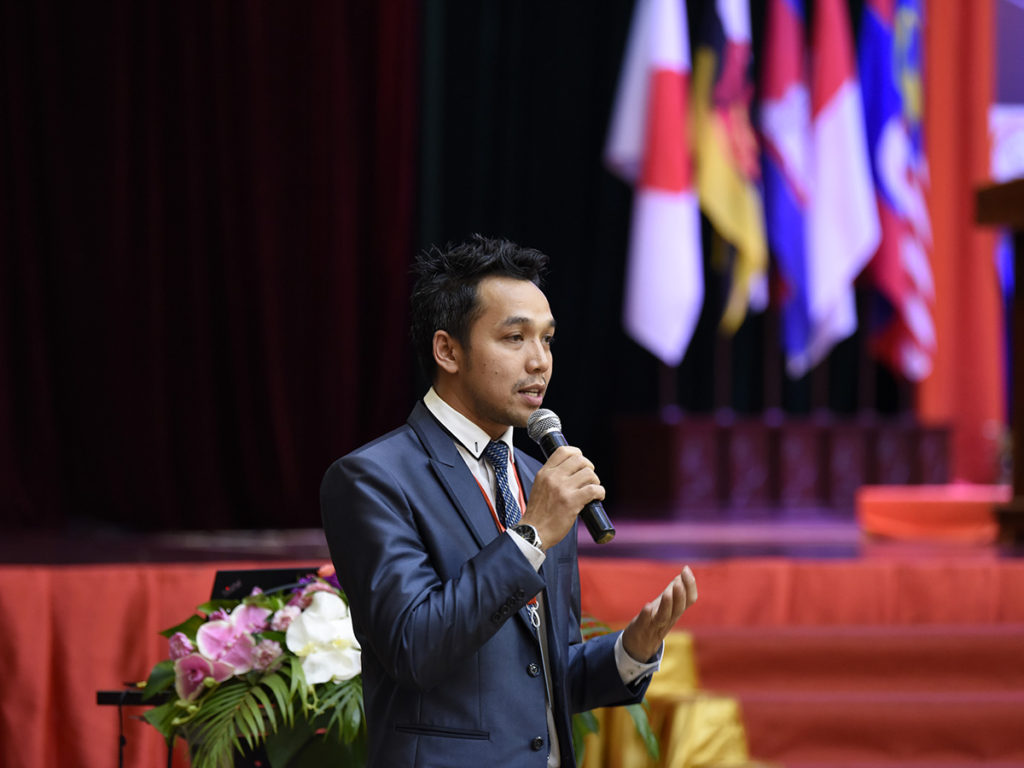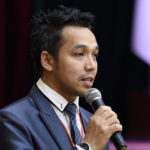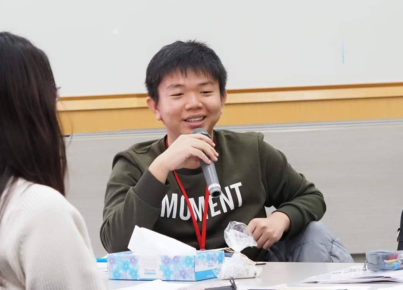“Message from Adviser”
Phonesavanh Latmany
Cities & Climate Change Officer of Global Green Growth Institute (GGGI)– Lao Country Programme
Laos
It has been a year since a report of the novel coronavirus disease or COVID-19 emerged. The COVID-19 pandemic has affected many aspects of our lives and will continue to do so in a foreseeable future as long as vaccine is not widely available. During this time, we all have experienced difficulties, to varying degrees and in various ways. My name is Phonesavanh Latmany, an adviser from Lao PDR to the Toshiba Youth Club Asia (TYCA) Vol. 3 in 2017, and I’d like to reflect on how the COVID-19 pandemic has affected my personal and professional life, provide my advice to young people, and my expectations of the post-COVID-19 world.
Early action was taken by the Government of Lao PDR, putting strict measures to contain community spread. At the time of writing (early December of 2020), there have been an accumulated number of 39 COVID-19 cases in Laos, most of which were imported. The numbers were considerably low compared to other ASEAN countries and Japan, in which hundreds of thousands have been infected. Despite no human fatalities, Lao economy has taken greater tolls on various sectors including tourism, trade, commodity prices, etc. The first few months of the pandemic, especially when lockdown and travel restrictions were implemented in late March, were a very difficult time. People were panicking and living in fear as the case numbers went up day after day. During the Lao New Year, which is annually celebrated in mid-April when people would be out in the streets splashing with water, streets were almost empty and quiet this year.
Schools were closed, workplaces inaccessible, gathering of people for meeting and/or workshop prohibited, major events cancelled or postponed, and people were urged to stay put at home with minimal travel, only when necessary. I had to work from home with my two kids around since school was closed. Work was done through an on-line platform including meetings and discussions. Luckily, virtual meetings were not something entirely new to me and my organization as we often use this for our day-to-day work. However, it was a different story for our counterparts whose existing infrastructure may not allow to do so effectively. People were rushing to buy and stock their food supply. We even changed the way we bought and replenished our food supply for any unexpected events. On the other hand, lockdown offered me an opportunity to spend a quality time with my family and we were sure to take the most out of it. We managed to establish our small garden where we grew a wide variety of vegetables for our own consumption such as morning glory, yard-long beans, spring onions, chilies, etc., and we are still planting them now.
Globally, young people are affected by COVID-19 pandemic. Schools are closed, classes are delivered remotely where feasible, social interactions among young children are limited, and very sadly some young people even died of it. To overcome these unprecedented challenges, I would urge young generations to step up and take the lead in a fight against COVID-19. For instance, they could harness the strengths of communication by using reliable source of information and spreading accurate information out to other people. They could take action by being a role model on how to protect oneself from the disease and/or being part of the community outreach program. More importantly, be the force of changes. I was so proud to be mentoring young students from various countries during the TYCA Vol 3 program in Japan. Specifically, the two students from Laos under my guidance are exceptionally phenomenal. TYCA program is the key that unlocks their potentials and both of them have now grown even more prominent among their peers both domestically and internationally. Both have continued seeking for international opportunities and journeys. International experience and network they gained from joining TYCA program really helped them become the leaders of their generation.
The world is at the crossroad where there are basically two choices to make. One is to go back to our business-as-usual scenario in terms of production and consumption patterns that were deemed unsustainable. The other is a green and resilient world where we use and manage our natural resources more sustainably, generate more shares of renewable energy, use eco-friendly mode of transportation, more nature-based solutions, and etc. I strongly wish that the world will transform into something that places green over the greed. COVID-19 presents an opportunity to restore our economy and at the same time curve our historical carbon dioxide emissions to the level that is known to be safe for human and other living things on this planet. I have been very delighted to learn that many countries across the globe have announced their green (recovery) deal and set concrete targets for net-zero emission. With this, I am hoping to see more clear blue skies with less air pollution, more green spaces and rich biodiversity, more clear rivers without plastic items floating around, and that we all will have built stronger resilience to any shocks that we may face in the future.
Closer to home, ASEAN and Japan are inter-connected socio-culturally, economically and politically with longstanding relation as a proof of that. With this unique tie and strongest partnership, ASEAN and Japan can strengthen our cooperation and work together on many fronts to address the pandemic issue and create the post-COVID world that we want. Big plans and packages have already been in motion such as ASEAN – Japan Economic Resilience Action Plan, COVID-19 Response Fund, etc. As mentioned above, we should take this opportunity and bounce back stronger and greener. Potential areas where ASEAN and Japan can work together include support on vaccine access and distribution, promotion of intra-regional tourism, transfer of green technology, transition to renewable energy, and last but not least continued promotion of friendship and exchange program among young people to strengthen the hear-to-heart relationship.
Needless to say, COVID-19 is the test of our time, our strengths, cooperation and solidarity, and resilience. While vaccines are being properly developed and tested, we started to adapt ourselves to the new normal in terms of working and continuing our lives. As case numbers around the world are still going up, we need to take cautions and be vigilant. Looking at the bright side, the pandemic also offers us opportunity to rethink our course of socio-economic development and start transitioning towards a more sustainable economic growth model. Finally, I wish all of my fellow advisers, students, TYCA-associated colleagues and their families a brighter beginning to 2021, stay safe and healthy. We all shall work individually and collectively in our capacities to overcome this difficult time and build the post-COVID world that is green and resilient.
新型コロナウイルス、すなわちCOVID-19の報告が出てから1年が経ちました。COVID-19のパンデミックは、私たちの生活の様々な面に影響を与えており、ワクチンが広く利用できない限り、今後この状況が続くでしょう。この間、私たちは皆、程度の差こそあれ、様々な形で困難を経験してきました。私は、2017年の東芝青年部アジア(TYCA)Vol.3でラオスからアドバイザーを務めているPhonesavanh Latmanyと申しますが。COVID-19パンデミックが私の個人的な生活や仕事にどのような影響を与えたかを振り返り、若者へのアドバイス、そしてCOVID-19後の世界への期待を述べたいと思います。
ラオス政府は早期に行動を起こし、地域社会への感染拡大を食い止めるために厳格な措置を講じました。本稿執筆時点(2020年12月初旬)で、ラオスにおけるCOVID-19の累積症例数は39件であり、そのほとんどが海外からの流入でした。これは、数十万人が感染している他のASEAN諸国や日本と比較してもかなり低い数値です。人的死亡者は出ていませんが、ラオス経済は観光、貿易、日常品の価格など様々な分野で大きな打撃を受けています。パンデミックが発生した最初の数ヶ月間、特に3月下旬にロックダウンと渡航制限が実施された時は、非常に困難な時期でした。症例数が日に日に増えていく中、人々はパニックに陥り、恐怖の中で生活していました。毎年4月中旬に祝われるラオスの新年には、人々は通りで水かけ祭りを行います。しかし、今年は、通りに人通りはほとんどなく、とても静かでした。
学校は閉鎖され、職場への立ち入りができず、人が集まって会議やワークショップをすることは禁止され、大きなイベントはキャンセルや延期されました。家にこもり、必要な時にだけ、最小限の移動をするように促されていました。子どもたちの学校が休みだったので、2人の子供が自宅にいる状態で、仕事をしなければなりませんでした。仕事は、ミーティングやディスカッションを含むオンラインプラットフォームを介して行われました。幸いなことに、バーチャルミーティングはこれまでにも利用していたので、私にとっても私の所属する組織にとっても全く新しいものではありませんでした。しかし、既存のインフラでは効果的に会議を行うことができない場合もあります。私たちの取引先の方の中にはバーチャルミーティングを行うことが難しい方もいました。人々は食料を購入し、ストックするために急いでいました。私たちは、不測の事態に備えて食料の購入と補充の方法を変えたほどです。一方で、ロックダウンは家族との時間を大切にする機会を与えてくれたので、それを最大限に活用することができました。私たちは、自分たちで消費するための野菜を栽培するために、小さな菜園を作りました。そこでは、朝顔、長豆、ネギ、唐辛子などを栽培し、今も植え続けています。
世界的には、COVID-19パンデミックの影響を受けた若者たちがいます。学校は閉鎖され、授業は可能な限り遠隔で行われ、幼い子供たちの間の社会的な交流は制限されています。そして非常に悲しいことに、パンデミックで亡くなった若者もいます。これらの前例のない課題を克服するために、私は若い世代に、COVID-19との戦いの先頭に立つことを強く求めたいと思います。例えば、信頼できる情報源を使って正確な情報を発信することで、コミュニケーション力の強みを活かすことができます。また、どのようにして病気から身を守るかについてのロールモデル(模範)となることや、地域社会への働きかけプログラムの一員となることで、行動を起こすことができます。もっと重要なのは、変化を起こす力になることです。TYCA Vol.3の日本でのプログラムでは、様々な国の若い学生の育成事業に関わることができ、とても誇りに思いました。特に、私の指導を受けたラオスからの2人の学生は驚異的でした。TYCAプログラムは彼らの可能性を引き出す鍵であり、二人は今では国内外の同級生の中でさらに際立った存在になっています。二人とも国際的な機会と旅路を求め続けています。TYCAプログラムに参加したことで得た国際的な経験とネットワークは、彼らが同世代のリーダーになるための大きな助けとなりました。
今、世界は岐路に立たされており、基本的に2つの選択肢があります。一つは、持続不可能と判断された生産や消費のパターンについて、従来通りのビジネスシナリオに戻ることです。もう一つは、天然資源をより持続可能な形で利用・管理し、再生可能エネルギーの利用率を高め、環境に優しい交通手段を利用し、自然を基にした解決策を提供する、緑豊かで回復力のある世界です。私は、世界が欲よりも緑を重視したものに変わっていくことを強く願っています。COVID-19は、私たちの経済を立て直す機会を提供すると同時に、過去の二酸化炭素排出量を、この地球上の人間や他の生物にとって安全であることが知られているレベルまで減少させることができます。私は、世界中の多くの国がグリーン(復興)協定を発表し、ネットゼロエミッション(実質排出量0)の具体的な目標を設定していることを知り、大変嬉しく思っています。これにより、大気汚染の少ない澄んだ青空、緑地や豊かな生物の多様性、プラスチック製品が漂うことのない澄んだ川を見ることができれば、と思います。そして将来直面するかもしれない衝撃的な出来事に対して、より柔軟に対応できる力が構築されることを期待しています。
もっと身近なところでは、ASEANと日本は社会的、文化的、経済的、政治的に相互に結びついており、長年の関係がそれを証明しています。このユニークな結びつきと最強のパートナーシップにより、ASEANと日本は協力を強化し、パンデミック問題に対処し、私たちが望むCOVID後の世界を創造するために、多くの分野で協力していくことができます。ASEAN-日本経済レジリエンス行動計画、COVID-19対応基金など、大きな計画や施策がすでに動き出しています。以上のように、私たちはこの機会に、より強固に、より緑豊かな世界になるように困難を跳ね返すべきです。ASEANと日本が協力できる分野としては、ワクチンの入手と配布、地域内観光の促進、環境保全技術の移転、再生可能エネルギーへの移行、そして最後になりましたが重要なこととして、心の交流を深めるための若者の友情と交流プログラムの継続的な推進などが考えられます。
言うまでもなく、COVID-19によって、私たちの生きる時代、私たちの強さ、協力と連帯、そして困難を跳ね返す力が試されています。ワクチンが適切に開発され、試験が行われている間に、私たちは仕事や生活を続けるという点で、新しい日常に適応し始めました。世界の症例数が増え続けている今、私たちは用心し、警戒しなければなりません。明るい面に目を向けると、パンデミックは社会経済発展の道筋を再考し、より持続可能な経済成長モデルへの移行を開始する機会を与えてくれます。最後に、私の仲間であるアドバイザー、学生、TYCAの同僚、そしてその家族の皆さんが、2021年がより明るいものとなり、安全で健康的に過ごせることを願っています。私たちは、この困難な時期を乗り越え、緑豊かでで回復力のあるCOVID後の世界を構築するために、個人として、また集団として努力していきたいと思います。








